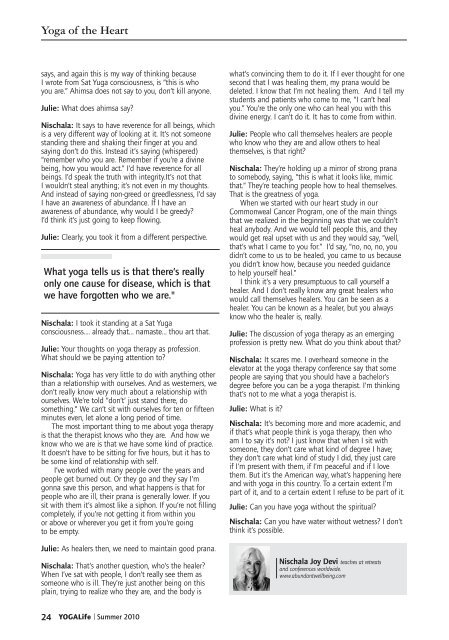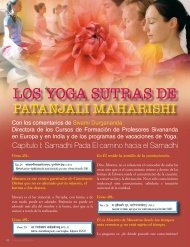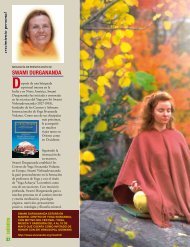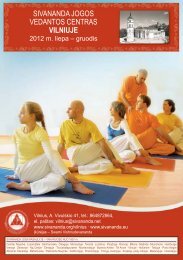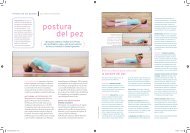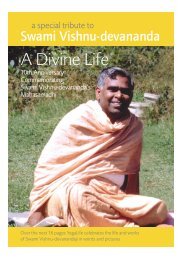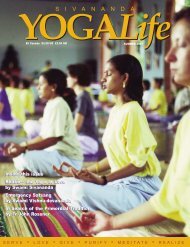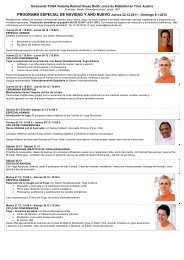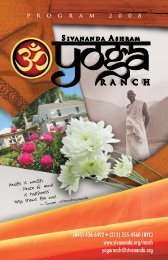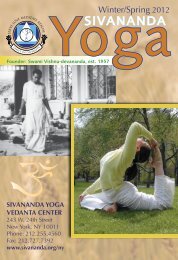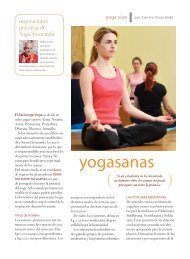YOGALife I Summer 2010 - Sivananda Yoga
YOGALife I Summer 2010 - Sivananda Yoga
YOGALife I Summer 2010 - Sivananda Yoga
You also want an ePaper? Increase the reach of your titles
YUMPU automatically turns print PDFs into web optimized ePapers that Google loves.
<strong>Yoga</strong> of the Heart<br />
says, and again this is my way of thinking because<br />
I wrote from Sat Yuga consciousness, is “this is who<br />
you are.” Ahimsa does not say to you, don’t kill anyone.<br />
Julie: What does ahimsa say?<br />
Nischala: It says to have reverence for all beings, which<br />
is a very different way of looking at it. It’s not someone<br />
standing there and shaking their finger at you and<br />
saying don’t do this. Instead it’s saying (whispered)<br />
“remember who you are. Remember if you’re a divine<br />
being, how you would act.” I’d have reverence for all<br />
beings. I’d speak the truth with integrity.It’s not that<br />
I wouldn’t steal anything; it’s not even in my thoughts.<br />
And instead of saying non-greed or greedlessness, I’d say<br />
I have an awareness of abundance. If I have an<br />
awareness of abundance, why would I be greedy?<br />
I’d think it’s just going to keep flowing.<br />
Julie: Clearly, you took it from a different perspective.<br />
What yoga tells us is that there’s really<br />
only one cause for disease, which is that<br />
we have forgotten who we are."<br />
Nischala: I took it standing at a Sat Yuga<br />
consciousness…. already that… namaste… thou art that.<br />
Julie: Your thoughts on yoga therapy as profession.<br />
What should we be paying attention to?<br />
Nischala: <strong>Yoga</strong> has very little to do with anything other<br />
than a relationship with ourselves. And as westerners, we<br />
don’t really know very much about a relationship with<br />
ourselves. We’re told “don’t’ just stand there, do<br />
something.” We can’t sit with ourselves for ten or fifteen<br />
minutes even, let alone a long period of time.<br />
The most important thing to me about yoga therapy<br />
is that the therapist knows who they are. And how we<br />
know who we are is that we have some kind of practice.<br />
It doesn’t have to be sitting for five hours, but it has to<br />
be some kind of relationship with self.<br />
I’ve worked with many people over the years and<br />
people get burned out. Or they go and they say I’m<br />
gonna save this person, and what happens is that for<br />
people who are ill, their prana is generally lower. If you<br />
sit with them it’s almost like a siphon. If you’re not filling<br />
completely, if you’re not getting it from within you<br />
or above or wherever you get it from you’re going<br />
to be empty.<br />
Julie: As healers then, we need to maintain good prana.<br />
Nischala: That’s another question, who’s the healer?<br />
When I’ve sat with people, I don’t really see them as<br />
someone who is ill. They’re just another being on this<br />
plain, trying to realize who they are, and the body is<br />
24<br />
<strong>YOGALife</strong> I <strong>Summer</strong> <strong>2010</strong><br />
what’s convincing them to do it. If I ever thought for one<br />
second that I was healing them, my prana would be<br />
deleted. I know that I’m not healing them. And I tell my<br />
students and patients who come to me, “I can’t heal<br />
you.” You’re the only one who can heal you with this<br />
divine energy. I can’t do it. It has to come from within.<br />
Julie: People who call themselves healers are people<br />
who know who they are and allow others to heal<br />
themselves, is that right?<br />
Nischala: They’re holding up a mirror of strong prana<br />
to somebody, saying, “this is what it looks like, mimic<br />
that.” They’re teaching people how to heal themselves.<br />
That is the greatness of yoga.<br />
When we started with our heart study in our<br />
Commonweal Cancer Program, one of the main things<br />
that we realized in the beginning was that we couldn’t<br />
heal anybody. And we would tell people this, and they<br />
would get real upset with us and they would say, “well,<br />
that’s what I came to you for.” I’d say, “no, no, no, you<br />
didn’t come to us to be healed, you came to us because<br />
you didn’t know how, because you needed guidance<br />
to help yourself heal.”<br />
I think it’s a very presumptuous to call yourself a<br />
healer. And I don’t really know any great healers who<br />
would call themselves healers. You can be seen as a<br />
healer. You can be known as a healer, but you always<br />
know who the healer is, really.<br />
Julie: The discussion of yoga therapy as an emerging<br />
profession is pretty new. What do you think about that?<br />
Nischala: It scares me. I overheard someone in the<br />
elevator at the yoga therapy conference say that some<br />
people are saying that you should have a bachelor’s<br />
degree before you can be a yoga therapist. I’m thinking<br />
that’s not to me what a yoga therapist is.<br />
Julie: What is it?<br />
Nischala: It’s becoming more and more academic, and<br />
if that’s what people think is yoga therapy, then who<br />
am I to say it’s not? I just know that when I sit with<br />
someone, they don’t care what kind of degree I have;<br />
they don’t care what kind of study I did, they just care<br />
if I’m present with them, if I’m peaceful and if I love<br />
them. But it’s the American way, what’s happening here<br />
and with yoga in this country. To a certain extent I’m<br />
part of it, and to a certain extent I refuse to be part of it.<br />
Julie: Can you have yoga without the spiritual?<br />
Nischala: Can you have water without wetness? I don’t<br />
think it’s possible.<br />
Nischala Joy Devi teaches at retreats<br />
and conferences worldwide.<br />
www.abundantwellbeing.com


